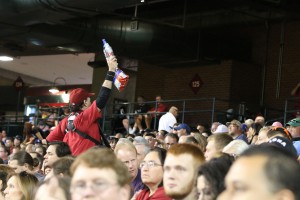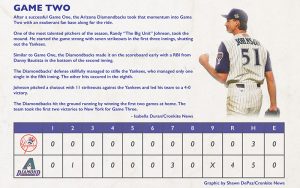- Slug: Sports-Puff and Rumble, 900 words
- 3 photo available
By Zach Larson
Cronkite News
This is the second in a series of stories looking at the Arizona Diamondbacks’ World Series run.
PHOENIX – When Jill Massara settled into her seats along the third base line, one thought kept skipping through her head.
“I hated the Yankees all my life,” Massara said. “They believed they were God’s gift to baseball. I was so excited and my gut feeling was we were going to win the game.”
The memories flow as if they are still fresh and not from 20 years ago, when the Arizona sports landscape seemed barren of championship trophies. The Arizona Rattlers had won two titles, in 1994 and 1997, but fans of other Valley teams often felt as if they were always watching ticker tape parades happen in distant cities.
The 2001 Arizona Diamondbacks changed all that.
In barely four years, the D-Backs had gone from an expansion team in the desert to winners of the National League. Now, as Game 1 of the World Series was about to commence, fans piled into Bank One Ballpark in downtown Phoenix and prepared to make history.
Massara and her husband Dennis watched from their seats behind the home dugout as Arizona starter Curt Schilling took the mound to face the three-time reigning world champion New York Yankees. Not surprisingly, the Yankees and their dynasty weren’t beloved in the Valley.
Massara’s journey to the World Series was drawn from her experience as an Arizona native. At the time, she had lived in Arizona for 22 years, residing in Lake Havasu City. Massara would drive four hours to the Valley to watch the Arizona Cardinals and Phoenix Suns, staying overnight and taking the trip back home the following day. Her love of the Diamondbacks stems from the visit the team made to Lake Havasu City in the early years of the franchise.
“They gave out team shirts and cushions to promote the team early on,” Massara said. “Those great memories of the team come back every time I open my closet and see my Diamondbacks shirt and cushion.”
That connection led Massara to purchasing tickets to Diamondbacks games from the beginning of the franchise’s existence in 1998 and traveling from her small Arizona town to Phoenix for baseball. Now she had the chance to watch a Fall Classic featuring the D-Backs, the fastest expansion team to reach a World Series, as they took on the big-pocketed Yankees.
After a 9-1 victory by the Diamondbacks in Game 1, Massara knew the team was destined to hoist the Commissioner’s Trophy.
“I knew we were going to do something great,” Massara said. “We had a whole team, a great city, great fans backing up the team.”
Game 2 at the BOB brought the Big Unit, Randy Johnson, to the stage for his first World Series game. Fresh off two dominant starts in the National League Championship Series against the Atlanta Braves, Johnson also had his third consecutive NL Cy Young award under his belt. That dominance continued as Johnson held the Yankees to three hits in a complete game shutout to give the D-Backs a 2-0 lead in the Series.
Jared Arons was an Arizona State student interning for the D-Backs that summer, working video production. “But the internship ended when the fall semester at ASU began,” he said. “So I returned to being a fan.”
Luckily, he added, his family had season tickets, allowing him to attend Games 2 and 7 at the BOB. Game 2 was especially tense, as he went with his father who had grown up in the Bronx and raised his son to be a Yankees fan.
“When Matt Williams hit his home run to give the D-Backs the lead, I jumped out of my seat and roared,” said Arons, who is now a 10News anchor in San Diego. ”My dad stayed seated.
“It was the first time I remember rooting against my dad (or his teams) and not feeling any guilt. I was 22. As a sports fan, that was the day I grew up and became my own fan, and not just a fan of whoever I was raised to cheer for. My baseball Bar Mitzvah, I guess.”
Daniel Gomez, an Arizona native, originally attended D-Backs games for the bonding experience with his two daughters and they would cheer the new franchise. But the moment when Gomez decided to invest himself completely came when he saw the talent and leadership shine as the D-Backs continued to persevere in dramatic ways throughout the 2001 season.
“You could see the on-field chemistry, and it was beautiful. We won a lot of games, but it was the way they won games,” Gomez said. “(They) could be down three runs in the ninth inning and they’d come back and win. Or they could be down 11 runs in the second inning, and they’d still come back. And when we had players that just bonded, and you could tell something beautiful was building.”
Arizona’s performance on the field led to Gomez buying season tickets and earning the chance to watch his team play throughout the postseason. After watching the first two games, Gomez thought there was a chance the Diamondbacks could lock up the Series on the road as it shifted to New York for Games 3, 4 and 5.
But almost a week after picking up the second win in the Series, Arizona returned to Bank One Ballpark facing the threat of elimination.
The Yankees had won all three games at home, including back-to-back walk off victories in extra innings. The script had flipped and a fourth consecutive title for the Yankees seemed inevitable. The emotional pull also seemed to be on New York’s side, as the country was still reeling from the Sept. 11 terrorist attacks just a few weeks earlier.
But Diamondbacks fans back in the Valley still had hope.
“I watched every game in the Series and just knew they were going to win,” Massara said. “I just kept telling myself it’s okay, it’s only a couple games they needed to win. Let’s go get them.”
D-Backs fans could breathe easier after an eight-run inning in the third propelled Arizona to an easy 15-2 win in Game 6, setting the stage for one final, monumental contest in the 2001 season.
Out of the four games in Phoenix, Game 7 is the one etched in every fan’s memory. The first seven innings were dominated by a spectacular pitching duel between Hall of Fame pitcher Roger Clemens and Schilling, the D-Backs’ ace who had already started two games of the Series and was pitching on short rest.
Heading into the eighth inning, a 1-1 score kept the crowd on its feet. Anxiety was at an all time high.
“I was definitely nervous. I knew we had Curt Schilling going and he had pretty much been undefeated, the whole postseason,” Gomez said. “He was basically unstoppable.”
But when Yankees second baseman Alfonso Soriano cracked an 0-2 pitch over the wall and broke the tie, the crowd mostly grew silent, except for the pockets of Yankee fans who were suddenly raucous. After the devastating home run against Schilling, New York’s closer Mariano Rivera entered the game in the eighth and recorded another scoreless inning in the Series.
An elusive championship was slipping away from the Diamondbacks and the fans could feel the game slowly turn in favor of the Yankees.
“When Soriano hit the home run, it was quiet,” Gomez said. “You could hear a pin drop. It was quiet, you could feel the emotion just run out of you.”
But in an unconventional move, Arizona manager Bob Brenly brought Johnson in for relief, even though he had started and won Game 6 one night earlier. Once Johnson returned to the mound in the ninth after recording the final out in the eighth inning, the crowd became energized again as he retired the side in order, one day after throwing 104 pitches.
“And then to see Randy Johnson just lifted our spirits more. You could tell we were the destined team at that time. We had a chance and it was, it was exciting,” Gomez said. “I watched the game last night with my son just to relive the moment a little bit and I could feel my hairs rise up and I was still excited.
“I knew the outcome and I was still excited to see Randy Johnson come in.”
Rivera, known as the greatest closer of all time, returned to the mound in the bottom of the ninth, facing Mark Grace. The crowd, waving their Diamondbacks towels, was the loudest it had been all Series and erupted as Grace singled to open the inning. An error by Rivera on a bunt attempt by Damian Miller put two runners on base. A groundout brought Tony Womack to the plate. Rivera threw his signature cutter inside and high to Womack who pulled his body inside the ball and ripped a double down the right-field line, scoring a run and tying the game again.
After Rivera unintentionally hit Craig Counsell with a pitch to load the bases, Arizona’s best hitter in the regular season sauntered to the plate. As Luis Gonzalez stared down baseball’s legendary closer, the realization that the Diamondbacks might actually win a World Series finally struck the crowd.
“I just knew I just felt something, there was something invigorating in your body,” Gomez said. “It was an aura. It was magical. Really magical.”
Gonzalez, breaking his bat, sent Rivera’s pitch over the head of Yankee shortstop Derek Jeter that landed in left-center field and plated the winning run, a soft blooper in the rain that is still known all these years later as the club’s greatest, most important hit. After seven excruciating games against the sport’s most storied dynasty, the Diamondbacks had won what many consider to be the best World Series of all time.
After watching Game 2 with his Bronx-raised father, Arons attended Game 7 with his step-mother.
“I told her as we walked to the stadium that I didn’t know what I should do or how to react if the D-Backs won,” he said. “I grew up in Phoenix and had never seen a local team win a title. When Gonzo hit that bloop and Jay Bell ran home, I started to cry and cheer at the same time.
“I guess I got my answer.”
Defeating Rivera and the Yankees on the walk off hit not only solidified the Diamondbacks as champions, it created the bond with fans who experienced the roller coaster of winning the first two home games, losing three straight on the road, and winning the final two games of the Series back in the BOB. The 2001 World Series created an experience that will never be forgotten.
“Fans were so riled up in the whole state. When they won, the fans went berserk. They will always be my team. They are my number one team forever,” Massara said.
“There’s a lot of teams that get there, but to win it, and within four years of their inception to win a World Series, it was magical, it was inspirational,” Gomez said. “I’ve never felt like that over a sports franchise. Because we’ve been unfortunate not to have one, but the Diamondbacks gave me a feeling I’ll never forget, I’ll always treasure and I love talking about.”
For more stories from Cronkite News, visit cronkitenews.azpbs.org.

